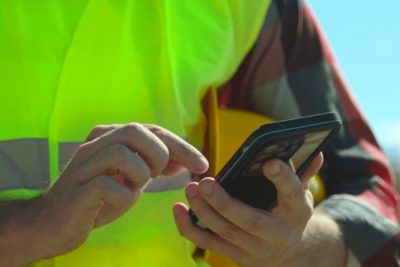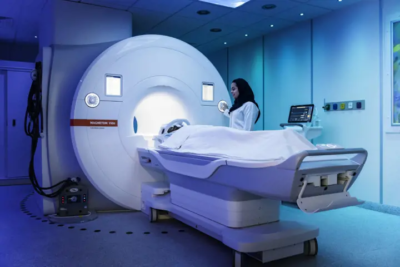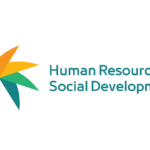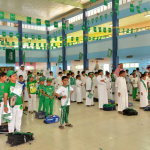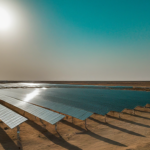
“I think the most important thing is the readiness of our people. There is always something you learn with each attack, and you go and you enhance your emergency response … and you make sure you have all what is needed to restore these facilities if they are attacked.”
–Amin Nasser, Saudi Aramco CEO, in a company statement reporting net income of $49 billion in 2020, down from $88.19 billion in 2019. “With more deployment of the vaccines we will see more demand pickup so we are very optimistic about 2021 in terms of growth in demand, especially in the second half, and we can see the prices so far responding to what we are seeing in the market, we are looking forward to a much better year in 2021.” [CNBC]

“In the past, it used to be very difficult to get the family involved in the educational and therapy process. However, due to this urgent situation where children are no longer spending around 20 hours at school per week, parents have no choice but to get involved. We should capitalize in these challenging times by keeping the family more involved, because we know that the more the family is involved, the greater the outcomes are.”
-Dr. Faisal Al-Nemary, chief operating officer at the Autism Center of Excellence (ACE) and adviser to the Ministry of Human Resources and Social Development on autism and disability-related issues, in an Arab News investigation of the challenges the Covid pandemic has presented to students with special needs in Saudi Arabia. [Arab News]

“What I hear is a consistent message from the Saudi leadership that they want to do their part to bring the conflict to a close … I’m confident that we’re going to be able to count on Saudi Arabia to do its part.”
–Tim Lenderking, U.S. Special Envoy for Yemen, in a television interview with the BBC and PBS following his second visit to Riyadh in the last 17 days. [Asharq Al-Awsat]

“T-Mobile US Inc. paid roughly twice that amount last year for a share sale that was about half the size of the Aramco offering.”
–Matthew Martin in Bloomberg reports on around $50m in incentive fees paid paid out recently to mostly local underwriters of the 2019 Aramco IPO worth $29.4b. Total fees for the IPO were just over $100m, “a tiny figure by global standards.” [Bloomberg]

“Some of these sites were known to ancient Greek and Roman historians or to travelers in the 18th and 19th centuries. Others have been studied extensively by modern scholars and archaeologists from Saudi Arabia and around the world. Very few, however, have been visited by tourists, and some are unknown even to Saudi citizens.”
–Arab News offers an in-depth report on five historic Saudi sites that are on UNESCO’s World Heritage List. Hail, Al-Ula, Al-Ahsa, historic Jeddah and Diriyah are featured. [Arab News]

“A survey by the British Council in Saudi asked 422 people, including filmmakers, cast and crew members, students, training and education providers about their visions for Saudi Arabia’s future in film: 77% of those surveyed believe that online streaming will be the most important distribution channel for Saudi productions in future.”
–Jennifer Holleis reporting for Deutsche Welle on Saudi Arabia’s developing film industry. [Deutsche Welle]

“The gap between revenue and fiscal expenditure has been so wide since 2015 that the rebound won’t alter the basic fact that governments need to find new sources of revenue.”
–Karen E. Young examines the current rise in oil prices in light of Gulf states’ deficit spending patterns since 2015 and the long-term need to diversify their economies. [Bloomberg Opinion]

“We anticipate solid mortgage and retail loan growth, supported by government efforts to meet Vision 2030 targets and strong demand for housing from Saudi nationals. Over the next couple of years, we forecast that mortgage portfolios will expand by about 30 percent a year.”
–S&P Global Ratings, in a note Tuesday. Domestic credit growth in Saudi Arabia is likely to stay strong in 2021-2022, following the sharp 14 percent year-on-year increase in 2020. [Zawya]

“The failed attempts to target the port of Ras Tanura do not only target the security of the economy and Saudi Arabia. They target the global economy and its oil supplies and the global energy security. The kingdom will take necessary and deterrent measures to protect its national resources to preserve global energy security and stop the terrorist attacks to ensure stability of energy supplies and security of petroleum exports.”
–Foreign Minister Prince Faisal bin Farhan said in Riyadh on Wednesday, days after a missile and drone assault on Saudi Aramco facilities. [Bloomberg]

“Globally, 23.7 GW worth of power purchase agreements (PPA) were signed in 2020, setting a record 18% above the 2019 total. More than one-fifth of those megawatts were in 35 contracts inked with Amazon, which was enough to put the company ahead of Google as the all-time top PPA customer.”
-Writing for Quartz, Tim McDonnell reports on the growth of PPAs by companies committed to utilizing more renewable energy. [Quartz]

